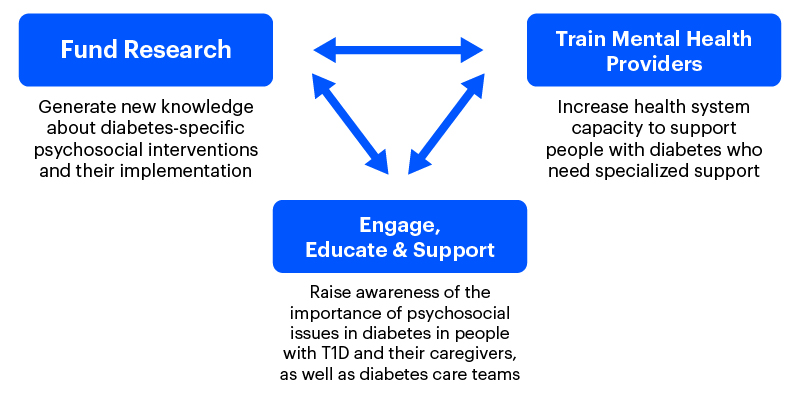
May is Mental Health Awareness month, a national movement to raise awareness of the importance of mental health, and the structural gaps that exist in accessing treatment and support.
There is no physical health without mental health, and this truth is beginning to be woven into a holistic approach to health care. JDRF has long recognized the need to accelerate that integration – particularly as it relates to our mission to improve the lives of people living with type 1 diabetes (T1D).
T1D affects a person’s emotional, social, and behavioural wellbeing throughout their lifetime, known collectively as psychosocial health. Psychosocial health is directly related to physical health, and to health outcomes like glycemic control in T1D. JDRF’s Mental Health Strategy aims to etter support this critical need that has long been underappreciated and undertreated in people with T1D.
T1D is a lifelong disease that involves constant blood sugar monitoring, counting carbs, fear of complications, and taking insulin every day to stay alive. The stress around diabetes management can manifest in depression, anxiety, and “diabetes distress” – a term describing the powerlessness, stress, guilt, relentless worry and denial that accompanies living with diabetes and the burden of self-care.
But for too long, healthcare practitioners focused exclusively on the physical manifestations of T1D without addressing mental health. Plus, T1D can be an isolating condition, and many living with it don’t have the social or community support that can help.
Gaps in mental health care for people with diabetes

Routine T1D appointments often do not address mental health

No standard mental health care referral pathway for people with T1D

Few mental health providers with T1D expertise in Canada

Insufficient funding for psychosocial research in T1D

Evidence from psychosocial research in T1D is not put into practice
It is for this reason that JDRF Canada developed a three-pronged approach to its mental health strategy:
- Funding research
- Training mental health providers
- Engaging, educating and supporting the diabetes community and healthcare providers

Funding Research
Strategic partnerships help JDRF leverage your generous donations and expand their reach. When we launched our Mental Health Strategy, we committed to funding new research in this area, and to working with partners for maximum impact. JDRF Canada and Brain Canada partnered in 2021 to co-fund three clinical studies designed to develop and test the effectiveness of psychosocial interventions to improve mental health and diabetes outcomes. Together, we awarded three grants to investigators building pilot studies designed in consultation with and for youth and young adults living with T1D.
Dr. Marie-Eve Robinson, Children’s Hospital of Eastern Ontario (CHEO)
Teaching adolescents with type 1 diabetes self-compassion (TADS) to reduce diabetes distress: A randomized controlled trial.
Dr. Robinson and her team are testing the effectiveness of a mindful self-compassion program on improving the diabetes distress experienced by youth aged 12-17 years with T1D. The program focuses on teaching self-kindness, mindfulness, and the idea that negative experiences are not personal failures, but part of the common human experience. Learning to leverage a self-compassionate mindset has the potential to not only lead to better mental health outcomes, but better glucose control too.
Accomplishments: Dr. Robinson and her team held two eight-week self-compassion courses in the fall of 2022 and two more in the spring of 2023.
Future plans: The results of this research will inform future study designs to adapt and optimize the program and explore the integration of such an intervention at a diabetes camp. This program could also be adapted to younger children with T1D.
Dr. Tricia Tang, University of British Columbia
A randomized wait-list controlled trial of the REACHOUT intervention
Dr. Tang and her team at the University of British Columbia are using a virtual care platform to deliver peer-led mental health support to adults with T1D in rural and remote communities in BC, through a mobile app called REACHOUT.
Accomplishments: The team recruited peer supporters and began training them in 2023. They have also conducted focus groups with peer supporters and participants from the initial pilot study, funded with generous donor support in 2022. This feedback allowed the team to make upgrades and improvements to adapt the REACHOUT platform.
Future plans: Dr. Tang and her team will continue to recruit participants and peer supporters, as well as update the intervention curriculum based on feedback from the focus groups.
Dr. Peter Selby, Centre for Addiction and Mental Health (CAMH)
Technology-enabled comprehensive care for young adults with type 1 diabetes and diabetes distress
Dr. Selby and his team are bringing experts in mental health and T1D care together with those who have lived experience of T1D to co-develop a solution for diabetes distress for adults between the ages of 18 and 29, a group disproportionately vulnerable to diabetes distress. The project will focus on a digital-first platform that can be scaled and implemented more broadly to reach more individuals living with T1D.
Accomplishments: The investigator team kicked off their research by defining key elements of the project and developing a prototype platform or the diabetes distress intervention. They established a partner advisory committee of six people with lived experience of T1D to consult on all activities.
Future plans: The team will adjust the program as needed and are planning to a randomized control trial to confirm the efficacy of the model before scaling nationally or tailoring it to specific groups.
JDRF is helping to facilitate recruitment for both Dr. Tang and Dr. Peter Selby’s studies through our Clinical Trials webpage
An additional $4M research investment
In partnership with the Canadian Institutes of Health Research (CIHR), JDRF will shortly be announcing 4 new grants in the area of mental health and T1D with a total investment of $4 million ($1 million per grant).
Training Mental Health Providers
JDRF Canada and Diabetes Canada collaborated to launch the Mental Health + Diabetes Training Program in English and French in March 2023. The course consists of two streams: one for mental health providers in Canada – including registered psychologists, clinical counsellors, psychotherapists, social workers, psychiatrists, and mental health nurses – and one for the diabetes community and healthcare providers, caregivers, family members, friends, and anyone who wishes to take the general stream of the course.
Despite the large number of people living with the condition, only a handful of mental health providers in Canada have in depth knowledge of the unique psychosocial challenges that come with living with diabetes. The goal of the Mental Health + Diabetes Training Program is to increase knowledge about diabetes among mental health providers in Canada so as to prepare them with sufficient knowledge and skills to assess and treat their patients living with the condition. This program provides knowledge and tools to help these providers deliver the best support to their clients with type 1 or type 2 diabetes and expand the capacity of health systems to meet this need.
We are thrilled to collaborate with Diabetes Canada, which will allow us to expand our reach across the country to improve the quality of life of more Canadians with diabetes.
As of early April 2023, 176 mental health providers and 484 individuals in the general stream have registered for the Training Program.
“The Mental Health + Diabetes Training Program provided me with pertinent information about the physical and mental health effects of both type 1 and type 2 diabetes. After completing all areas of the training including the e-learning modules and the live session, I feel confident to incorporate the comprehensive material into my private practice.” – Monica Murray, Registered Psychotherapist, Ontario
Mental health providers who complete the Training Program can join a new, publicly accessible Mental Health + Diabetes Directory, to be launched later in the year. The bilingual directory will allow healthcare providers and people living with diabetes to be referred or self-refer to trained providers who can offer specialized support specific to living with this chronic disease.
The directory will also help to address the system gap of a lack of a standard referral pathway for people living with diabetes to connect with a mental health provider trained specifically in the needs of people with diabetes.
Engagement, Education and Support
Our mental health strategy’s engagement, education and support activities will focus on health care providers as well as people who live with T1D and their families and caregivers.
JDRF’s new Mental Health Advisory Council, a diverse group of more than 100 volunteers from across Canada with lived experience of T1D, are collaborating with us to shape initiatives of the mental health strategy to ensure maximum impact and that they are driven by the T1D community, for the T1D community.
JDRF is currently developing new educational materials for healthcare providers – endocrinologists, nurses, GPs, and other healthcare professionals that cover some of the mental health aspects of T1D. We built a dedicated section on our website for healthcare providers and kicked off a virtual event about T1D and mental health in the fall of 2022. We are also encouraging healthcare providers and diabetes care teams to enroll in our Mental Health + Diabetes Training Program.
We will continue to collaborate with Diabetes Canada and other partners to expand and deepen healthcare provider engagement by delivering new educational resources such as electronic briefs, hosting webinars and educational events, and promoting the Mental Health + Diabetes Directory among healthcare providers, so they have a referral source for their patients.
You can view past recordings on our YouTube channel.
With our Mental Health Advisory Council’s input, we will continue to expand our mental health website content, build awareness of our Mental Health + Diabetes Directory so individuals feel empowered to self-refer, and develop new approaches to further educate and connect the community.
We are measuring success by evaluating the impact of each initiative, including with a research study to follow outcomes and impact of the Training Program and directory.
JDRF Canada extends our gratitude for the support of our Advisory Council, Cabinet Members and philanthropic partners, including charitable partners Brain Canada and Diabetes Canada.
New funding investments and partnerships are still needed as we go forward. For more information, please email mentalhealthstrategy@jdrf.ca




